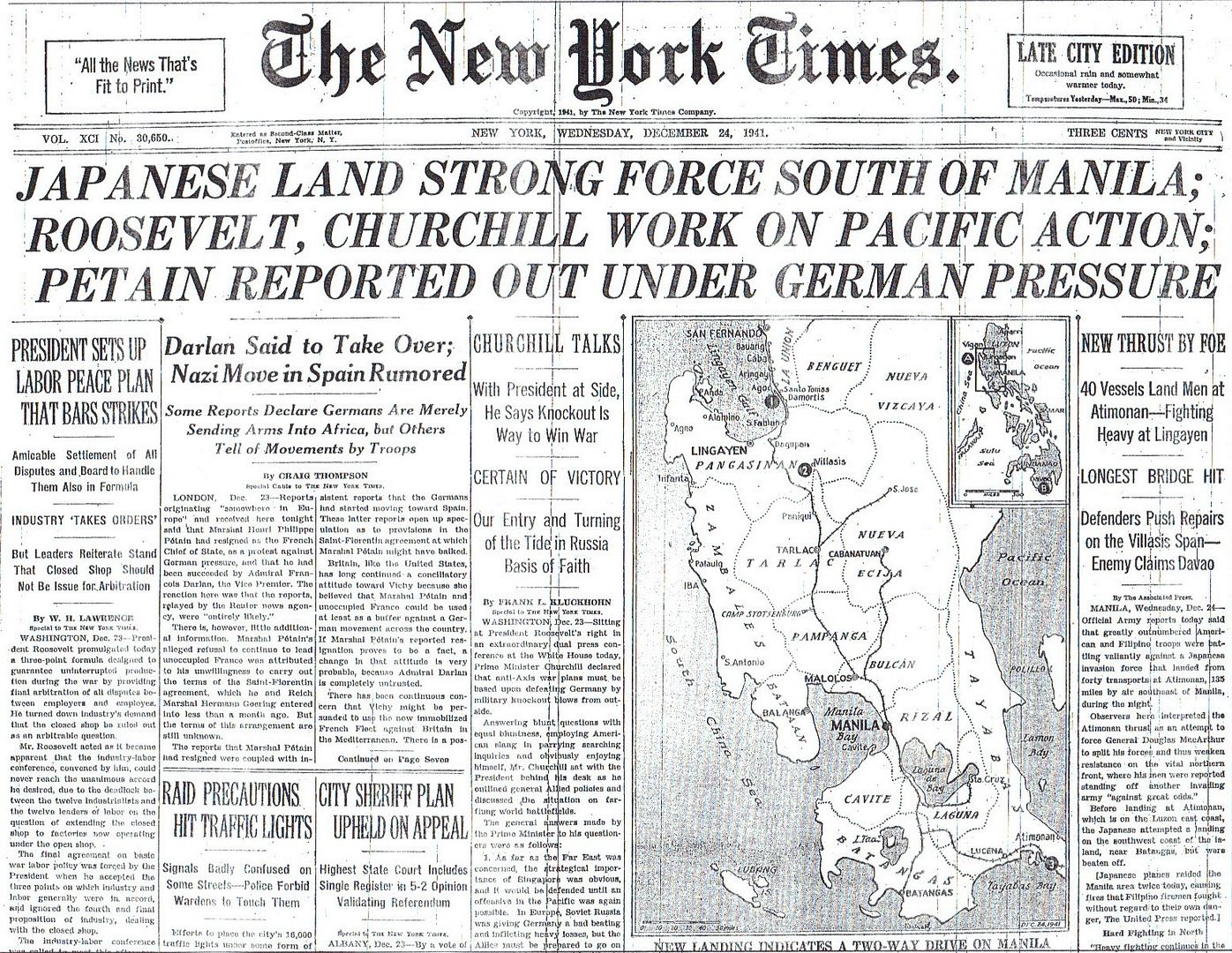
Posted on 12/24/2011 5:21:03 AM PST by Homer_J_Simpson

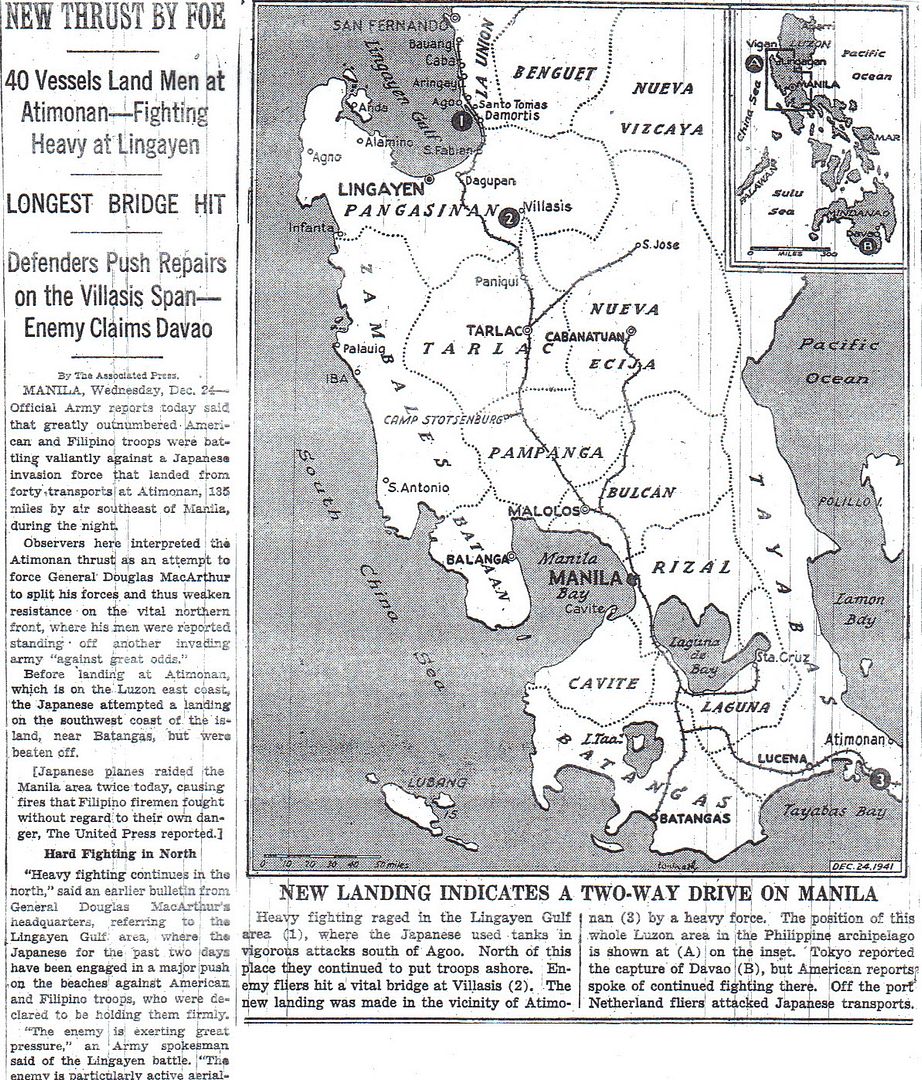
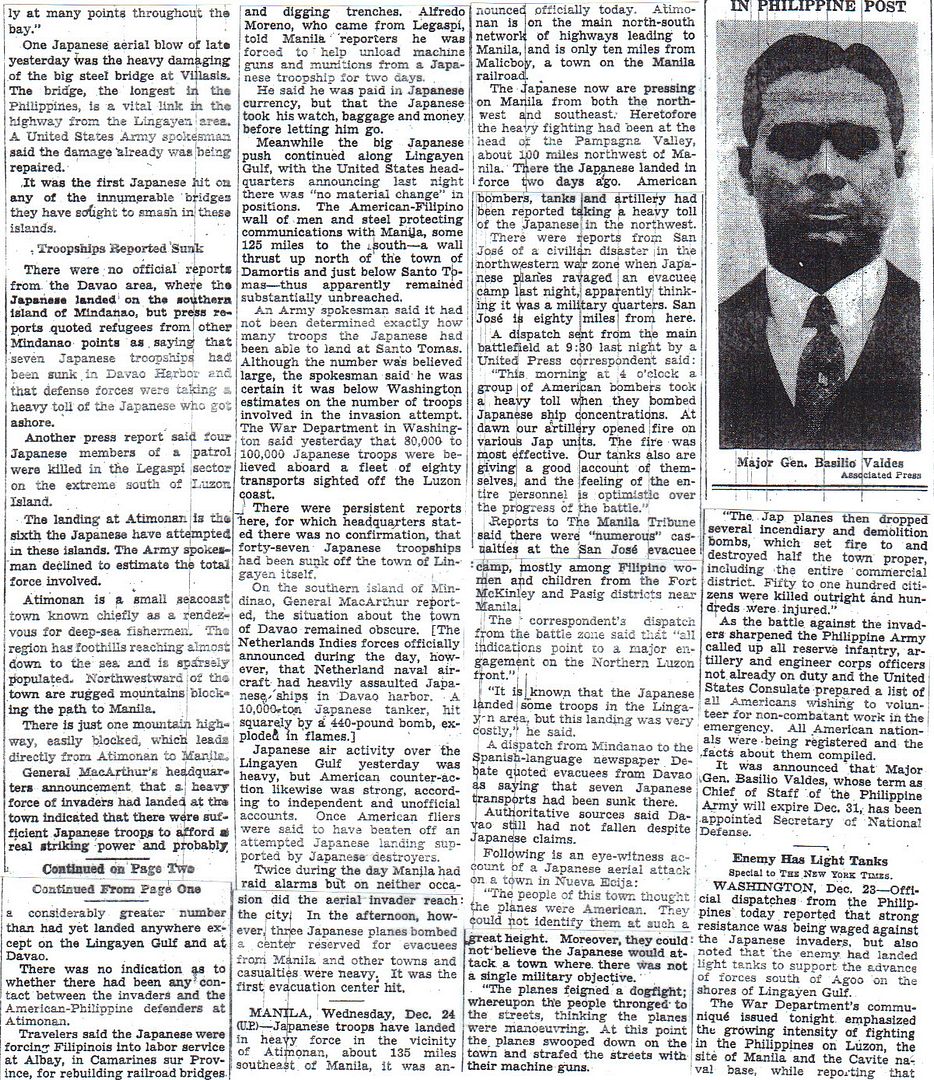
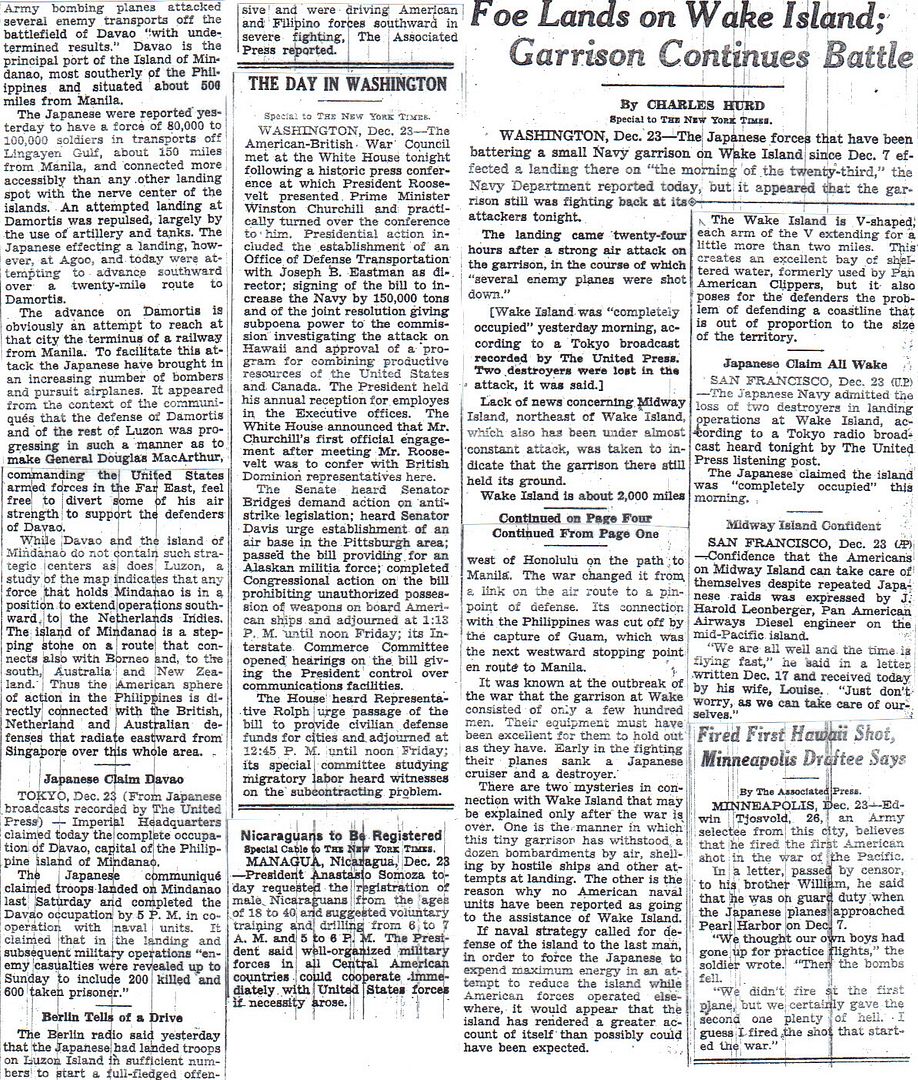
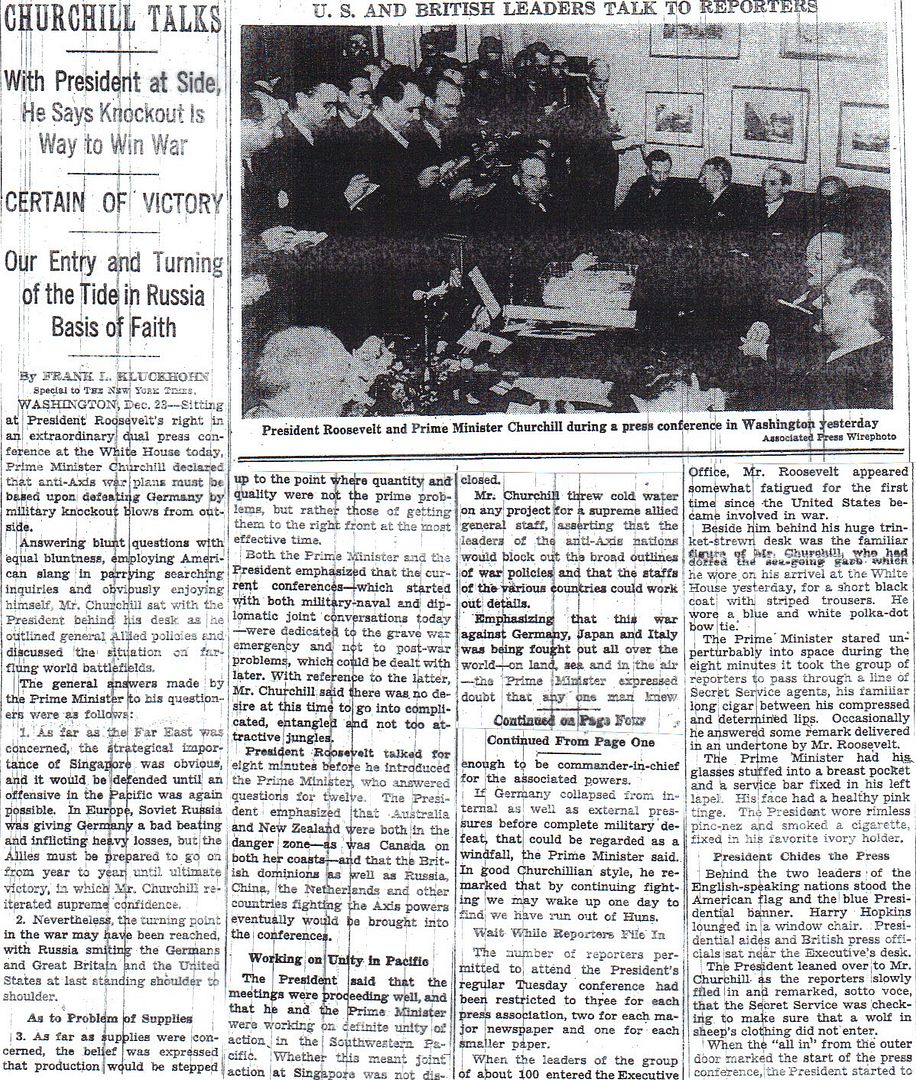
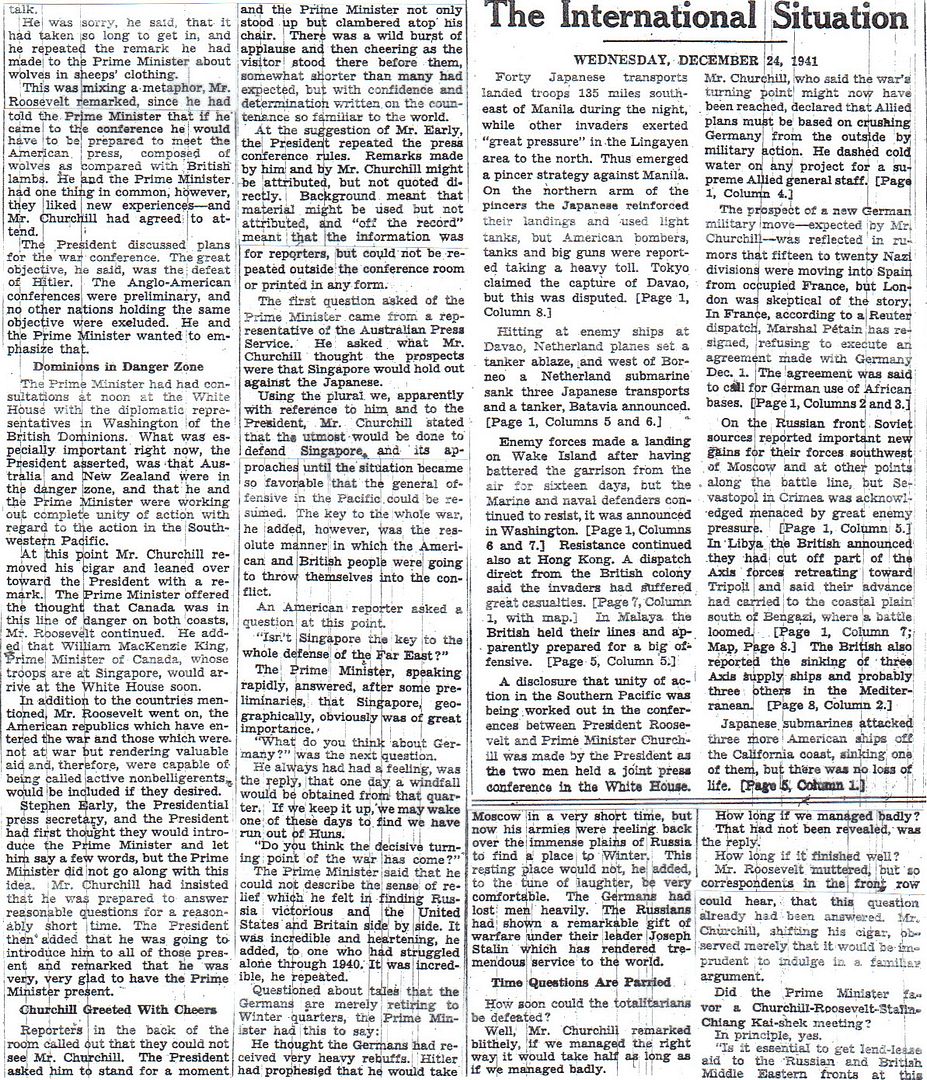
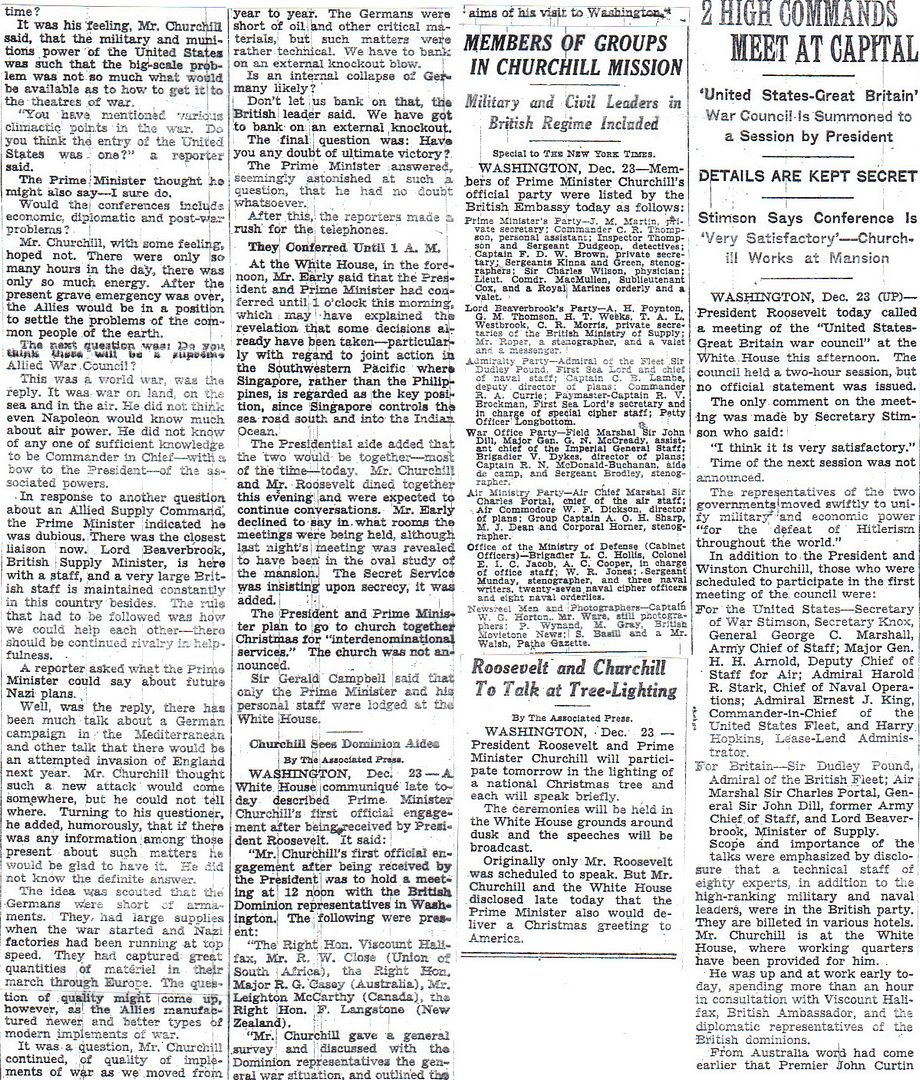
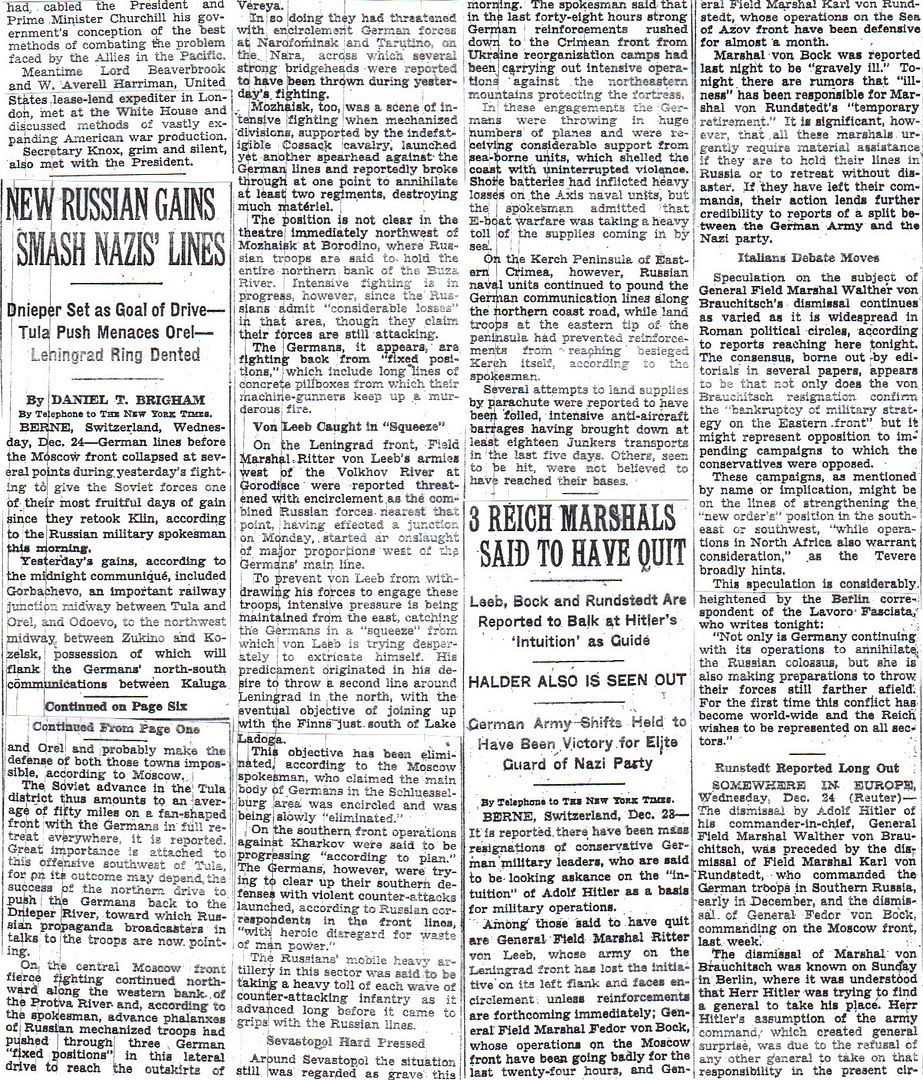
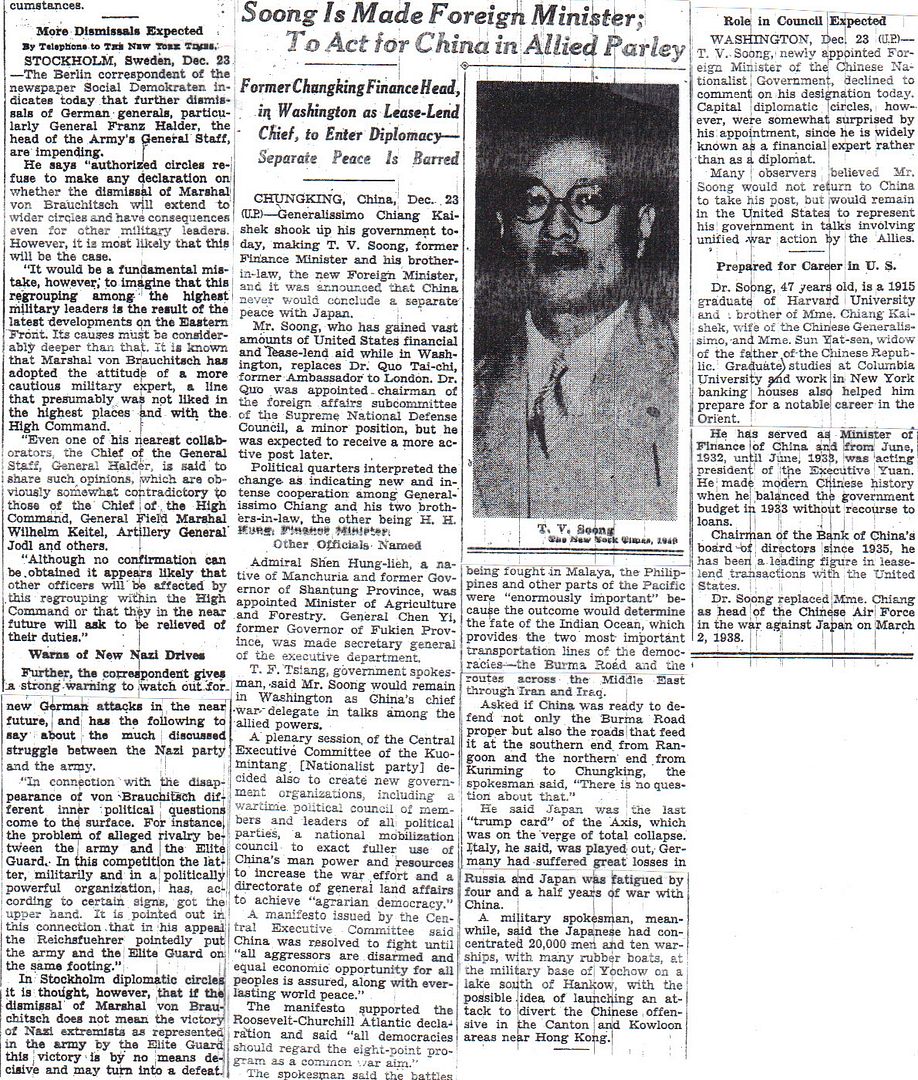
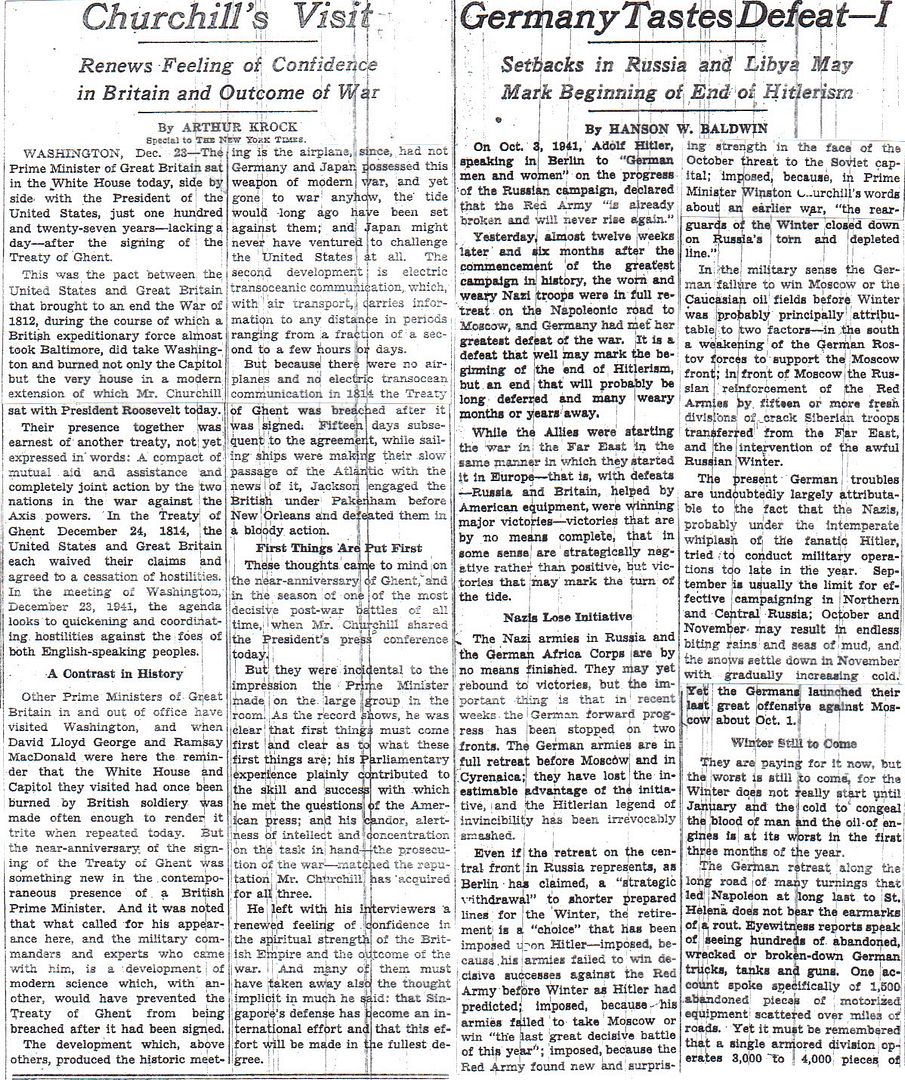
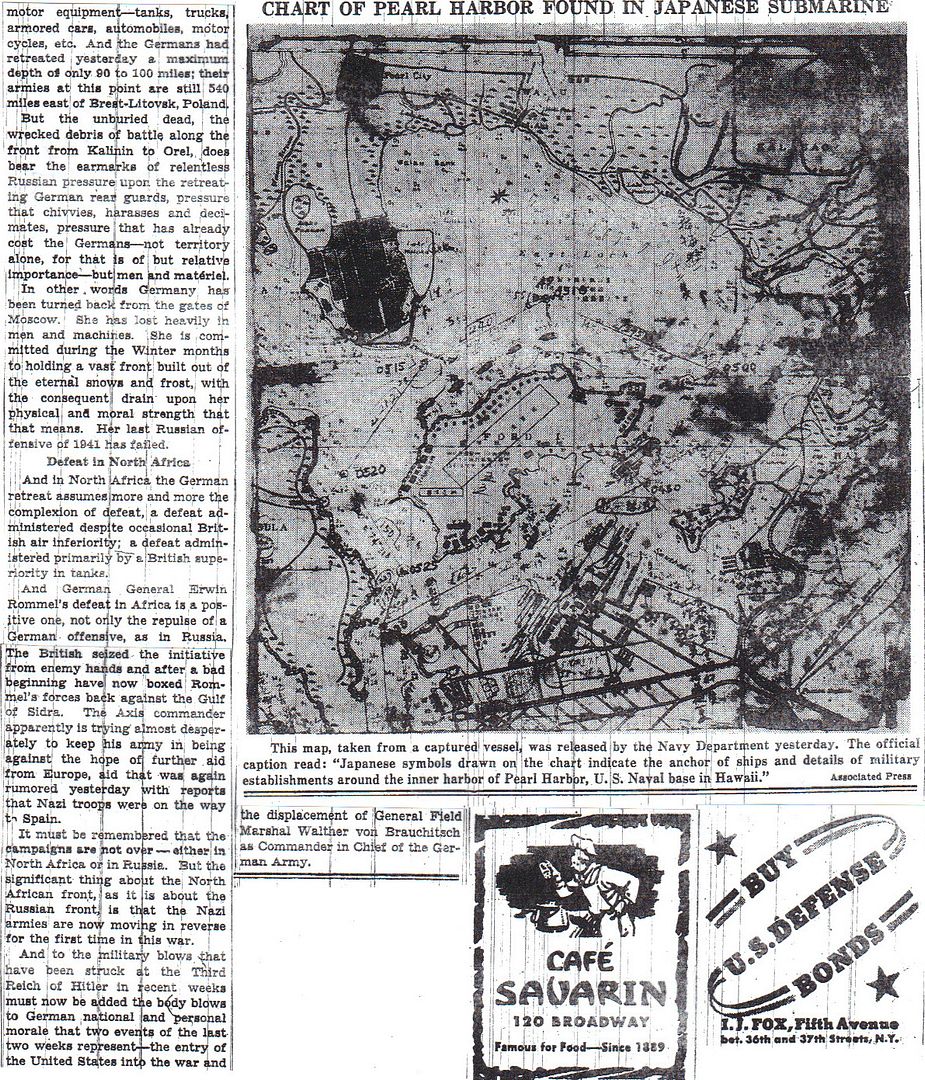
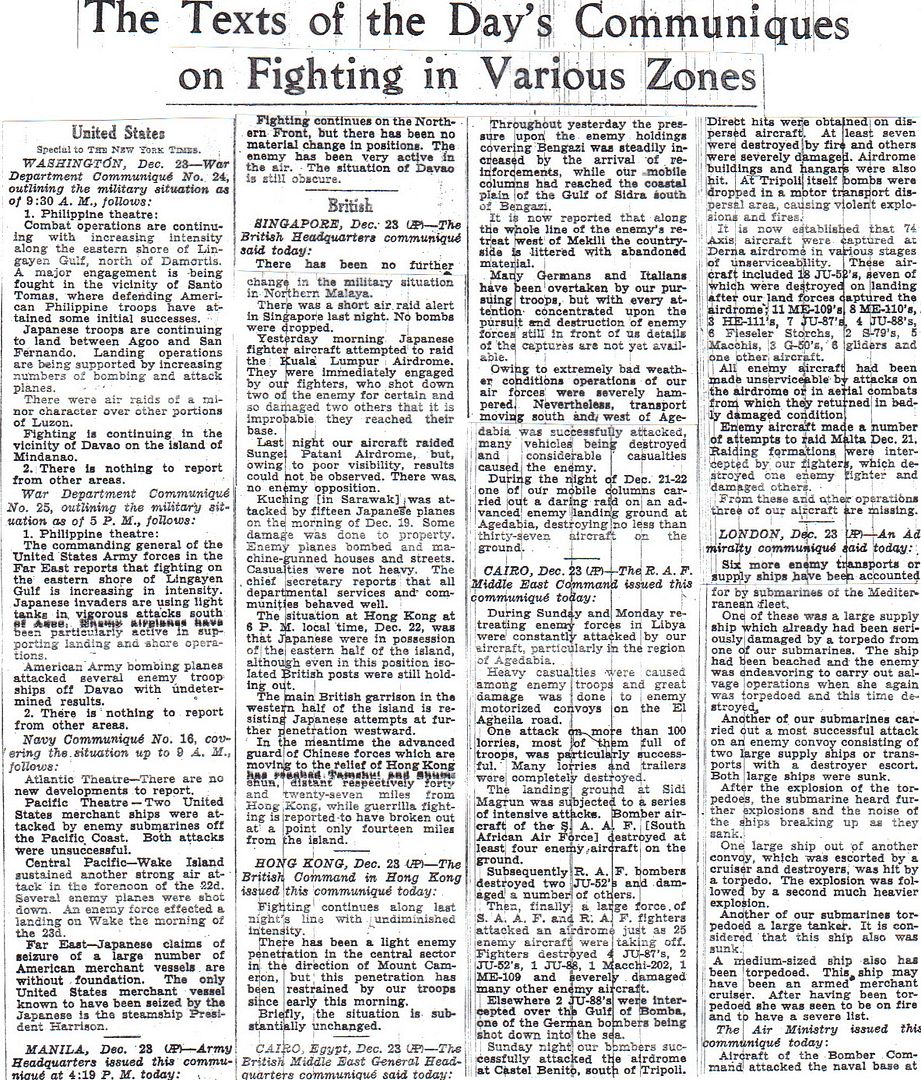
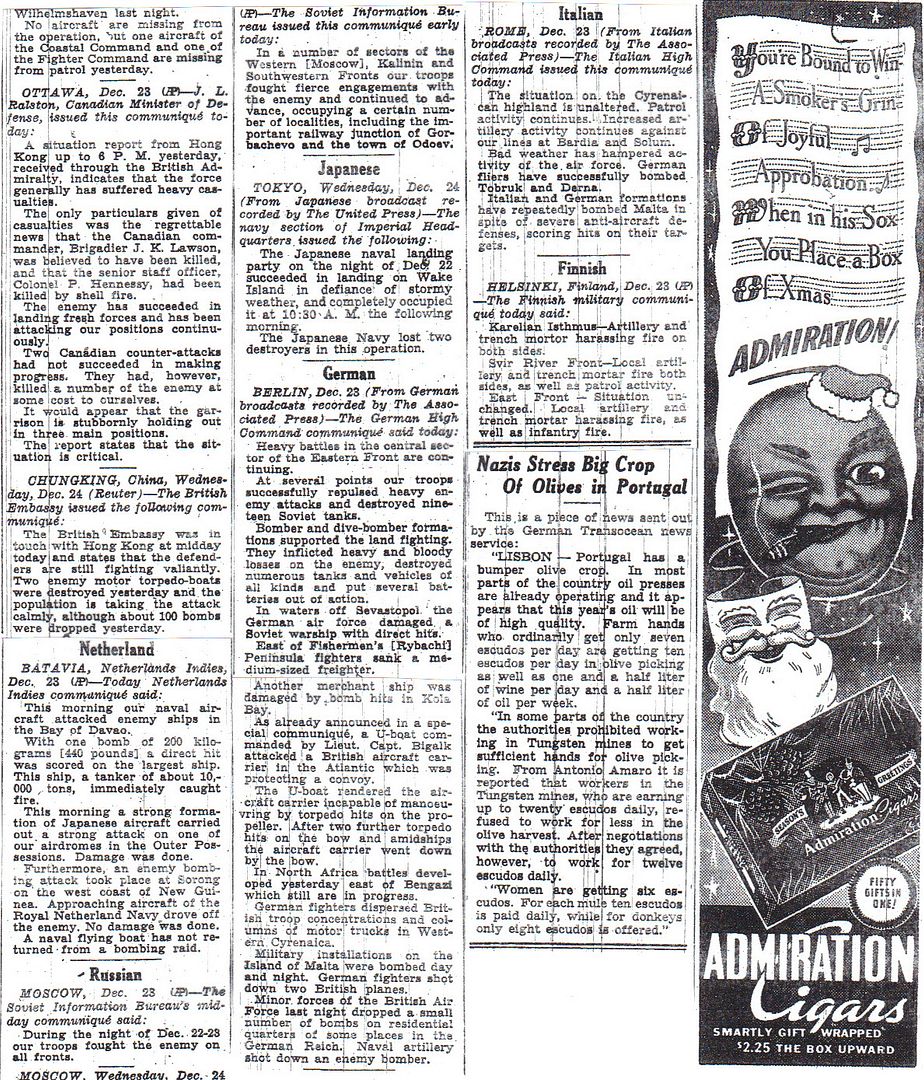
http://www.onwar.com/chrono/1941/dec41/f24dec41.htm
More Japanese land on Luzon
Wednesday, December 24, 1941 www.onwar.com
In the Philippines... About 7000 troops of the Japanese 16th Infantry Division land at Lamon Bay in southeast Luzon. In northern Luzon, the Allies have taken the first of five defensive positions designed to delay the Japanese movement toward the Bataan Peninsula. General Douglas MacArthur still commands the forces.
In the Sulu Archipelago... Japanese forces land on Jolo Island.
In the North Atlantic... Free French forces, using corvettes and a submarine occupy the islands of St. Pierre and Miquelon off the coast of Canada.
http://homepage.ntlworld.com/andrew.etherington/month/thismonth/24.htm
December 24th, 1941
GERMANY:
U-648, U-672 laid down
U-610 launched.
U-460 commissioned. (Dave Shirlaw)
U.S.S.R.: The positions of the Spanish 250.Infanterie-Division or ‘Division Azul’ (Blue Division) of the Wehrmacht, at Udarnik and Gorka come under attack. General Munoz Grandes has commanded the division to hold its present positions ‘as though nailed to the ground’, and the Spaniards do just that. (Russ Folsom)
LIBYA: Benghazi: Battle-worn and weary, after a month of continuous fighting, men of the 8th Army captured this wrecked town today. Rommel has fought all the way, shielding his few remaining Panzers with potent anti-tank fire and fending off British attempts to outflank his retreating Afrika Korps. His main threat came from the Desert Air Force, which itself was badly hampered by poor weather.
With heavy casualties to his men and the loss of 170 fighting vehicles, Rommels army has been badly hurt by Operation Crusader, and its commander faces a long wait for replacements.
General Auchinleck could press on towards Tripoli and complete victory in North Africa. But his men are tired, and his tanks have suffered badly in fierce desert combat. The replacement crews are “green”, and the pattern of desert war is repeating itself in that it is the British turn to suffer from stretched lines of communication.
British troops were in a similar position once before - only to be moved to Greece to disaster. On December 12, Auchinleck was told that his much-needed reinforcements of two divisions, four light bomber squadrons and a consignment of anti-tank guns were being diverted - to the Far East.
Flower class corvette Salvia which had been attempting to rescue Axis POW’s from the sunken Shuntien, is torpedoed and sunk by U-568 about 100 miles West of Alexandria at 31 48N 28 00E. There are over 900 casualties, as no one survives this sinking. (Alex Gordon)(108)
COMMONWEALTH OF THE PHILIPPINES: Lamon Bay in southeast Luzon is the point of an additional Japanese landing. US and Filipino forces fall back to the 1st of 5 defending lines in northern Luzon. MacArthur’s intention is to fall back onto the Bataan Peninsula and await reinforcements and supplies from the US.
Manila: The Japanese noose is beginning to close on the capital of the Philippines. A second support force, numbering 7,000 landed today at Lamon Bay, on Luzon’s east coast, and is expected to try to link up with General Homma’s 43,000-strong main force which landed two days ago by 85 transports in the Lingayen Gulf and is only 120 miles from Manila.
However, because of intelligence overestimates, the US C-in-C, General MacArthur, who has only 25,000 US troops and Filipino scouts available to defend Manila, has declared it an open city and started to withdraw his men to the Bataan peninsula where they will regroup.
Japanese troops land on Jolo in the Sulu Archipelago today and tomorrow.
PALMYRA ISLAND: A Japanese submarine shells the atoll slightly damaging a dredge without inflicting casualties. (Gordon Rottman)
CHINA: Changsha: Central China’s gateway city of Changsha is in danger of being overrun by Japanese forces for the third time in 12 months as the deadlocked conflict between Japan and China flares again. The Japanese have moved on Changsha to head off a Chinese Nationalist force from Hunan that was being moved south to Canton to attack Japanese forces in order to relieve pressure on Hong Kong.
HONG KONG: Destroyer HMS Thracian bombed and sunk. (Dave Shirlaw)
CANADA: Corvette HMCS Orillia arrived Halifax, Nova Scotia for refit. (Dave Shirlaw)
U.S.A.:
Destroyer USS Cony laid down.
AA cruiser USS Atlanta commissioned. (Dave Shirlaw)
ATLANTIC OCEAN: Submarine HMS H-31 sunk by mine in Bay of Biscay.
Corvette HMS Salvia sunk by U-568. (Dave Shirlaw)
I remember one of the first “war movies” that made a big impression upon me as a kid was “Wake Island.”
He was a crusty old fart and when a Japanese driver would come in (lots of local fish markets), he'd walk up and berate him and his ancestors.......this guy was way beyond giving a sh*t. He absolutely hated anything to do with the Land of the Rising Sun.
http://www.naval-history.net/xGM-Chrono-01BB-Duke%20of%20York.htm
22nd – DUKE OF YORK arrived in Chesapeake Bay. She then proceeded to Norfolk Navy Yard where Churchill and party disembarked and travelled to Washington for their series of meetings which became known as the ARCADIA conference.
(The ARCADIA conference and its outcome was arguably the most important conference of the war for Great Britain; for as General Marshall, the chairman of the US Joint Chiefs of Staff, stated, “notwithstanding the entry of Japan into the war, our view is that Germany is still the prime enemy and her defeat is the key to victory”. FDR courageously endorsed this view and took the decision of ‘Germany first’, for at the time the US population were clamouring for revenge after Pearl Harbour and felt less urgency in securing the defeat of Hitler. So Churchill achieved what was his main priority for the conference.
The two leaders also called for the formation of a “grand alliance of the Allies” and between them they drew up a solemn declaration to be signed by all nations at war with Germany, as they had done with the Atlantic Charter.
On 1/1/42, representatives of 26 Allied nations signed the “Declaration by the United Nations”. Pledging to support the Atlantic Charter, the signatories agreed to commit their full resources to the defeat of the Axis powers, promised to make no separate peace, and agreed to preserve idealistic virtues such as freedom and justice. Later it would be said that this signing was the birth of the United Nations. At a time when the Germans controlled the European continent and the Japanese were sweeping across the Far East the Philippines and the Pacific, the Declaration provided millions with an uplifting message of hope.
The conference also established a Joint Anglo-American Chiefs of Staff to control the future conduct of the war, the most complete unification of military effort ever achieved by two allied nations)
23rd – DUKE OF YORK remained at Norfolk, Va to re-embark the Prime Minster after the conference, which was scheduled to last a week
(In fact, the Prime Minster did not leave the White House until 14/1/42)
Von Leeb is an interesting guy. Didn’t like the Nazis or Hitler, helped put down the Beer Hall Putsch, and opposed the invasions of the low countries. His title was earned, not inherited, and despite the ‘von’, he didn’t participate in the July plot.
Despite his view of the Nazis, he did his duty as an officer to his country to the best of his ability.
OOPS!
Of course two weeks into the war, he has no supplies on Bataan, which will have severe consequences since soldiers can't fight without food, medicine, and ammunition...
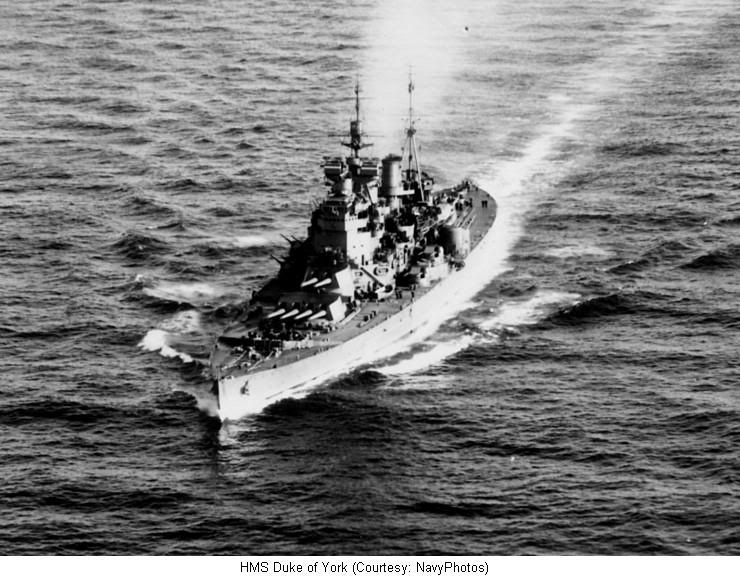
Understandable...
My Dad wasnt that extreme, but he had strong feelings, too.
BTW, I guess I could always google it, but I’m somewhat surprised to hear there were any survivors/pows from the battle of Wake Island.
As I understand it, several hundred were shipped around to endure the war as POW laborers....the 98 that remained to labor on Wake were mass murdered toward the end of the war.
I’ve enjoyed Baldwin’s articles on the Eastern Front as well. Despite both sides limiting the amount of information available to the west, Baldwin has correctly identified all of the issues for both sides in the war in the east.
He’s still not quite up to speed on the war in the Pacific, not yet anyway.
In the meantime, I pinged you on a post containing an abbreviated timeline I created of events pertaining to the U.S. Army Air Corps in the Philippines between Oct 1941 and Dec 8, 1941 here: http://www.freerepublic.com/focus/f-chat/2824193/posts?posts?page=16#16. Where specific entries I extracted from Gen. Brerenton's diaries significantly disagree with your understanding of events, please address them.
Baldwin's been studying up on the Philippines and will produce a two-parter on that campaign on the 26th-27th and then an analysis piece for the News of the Week in Review on the 28th. We shall see if he is up to speed on that particular aspect of the Pacific Theatre.
Speaking of the war in the Pacific, the Japanese are having a heck of a time taking Wake Island. Despite their overwhelming superiority in numbers and firepower they are still struggling to take the island. Amphibious operations against determined, dug-in defenders must be a tricky proposition. I hope the U.S. Navy and Marine Corps are taking good notes on the problem. They may come in handy if the roles are reversed one day.
Disclaimer: Opinions posted on Free Republic are those of the individual posters and do not necessarily represent the opinion of Free Republic or its management. All materials posted herein are protected by copyright law and the exemption for fair use of copyrighted works.